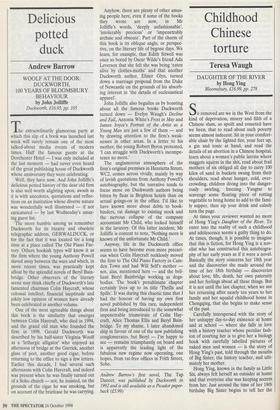Delicious potted duck
Andrew Barrow
WOOLF AT THE DOOR: DUCKWORTH, 100 YEARS OF BLOOMSBURY BEHAVIOUR by John Jolliffe Duckworth, £16.95, pp. 105 he extraordinarily glamorous party at which this slip of a book was launched last week will surely remain one of the most talked-about media events of modern times. Half the famous guests at the Dorchester Hotel — I was only included at the last moment — had never even heard of the great publishing house of Duckworth whose anniversary they were celebrating.
Well, they have now. And John Jolliffe's delicious potted history of the dear old firm is also well worth alighting upon, awash as it is with anecdotes, quotations and reflec- tions on an institution whose diverse nature was wonderfully well illustrated — if not caricatured — by last Wednesday's amaz- ing guest list.
The more humble among us remember Duckworth for its bizarre and obsolete telegraphic address, GERWALDUCIC, or for the fact that it was located for a long time at a place called The Old Piano Fac- tory. Others bookish types will know it as the firm where the young Anthony Powell slaved away between the wars and which, in more recent times, was practically kept afloat by the splendid novels of Beryl Bain- bridge. Other observers of the literary scene may think chiefly of Ducicworth's late lamented chairman Colin Haycraft, whose colossal intellect, financial ineptitude and joldly low opinion of women have already been celebrated in another volume.
One of the most agreeable things about this book is the similarity that emerges between Colin Haycraft, who died in 1994, and the grand old man who founded the firm in 1898. Gerald Duckworth was described by his half-sister Virginia Woolf as a 'lethargic alligator' who enjoyed an afternoon of bridge at the Garrick, another glass of port, another good cigar, before returning to the office to sign a few letters. Earlier this decade, I had several such afternoons with Colin Haycraft, and indeed was present when he was finally turned out of a Soho church — not, he insisted, on the grounds of the cigar he was smoking, but on account of the briefcase he was carrying. Anyhow, there are plenty of other amus- ing people here, even if some of the books they wrote are now, in Mr Jolliffe's words, 'deeply unfashionable', 'intolerably precious' or 'impenetrably archaic and obscure'. Part of the charm of this book is its oblique angle, or perspec- tive, on the literary life of bygone days. We learn, for example, that Edith Sitwell was once so bored by Oscar Wilde's friend Ada Leverson that she felt she was being 'eaten alive by clothes-moths' and that another Duckworth author, Elinor Glyn, turned down a marriage proposal from the Duke of Newcastle on the grounds of his absorb- ing interest in 'the details of ecclesiastical apparel'.
John Jolliffe also beguiles us by boasting about all the famous books Duckworth turned down — Evelyn Waugh's Decline and Fall, Antonia White's Frost in May and James Joyce's Portrait of the Artist as a Young Man are just a few of them — and by drawing attention to the firm's weak- nesses in other areas. In a letter to his mother, the young Robert Byron protested, 'I can struggle with Duckworth's incompe- tence no more.'
The unglamorous atmosphere of the firm's original premises in Henrietta Street, WC2, comes across vividly, mainly by way of lavish quotations from Anthony Powell's autobiography, but the narrative tends to focus more on Duckworth authors being bitten by fleas in Brighton hotels than on actual goings-on in the office. I'd like to have known more about debts to book- binders, rat damage to existing stock and the nervous collapse of the company accountant Mr Child, who locked himself in the lavatory. Of this latter incident, Mr Jolliffe is content to note, 'Nothing more is known of the unfortunate Mr Child.'
Anyway, life in the Duckworth office seems to have become even more precari- ous when Colin Haycraft recklessly moved the firm to The Old Piano Factory in Cam- den Town and had Will Self s mother — not, alas, mentioned here — and the bril- liant Beryl Bainbridge working as dogs- bodies. The book's penultimate chapter certainly lives up to its title 'Thrills and Spills'. It was during this chaotic time that I had the honour of having my own first novel published by this rare, independent firm and being introduced to the somewhat impenetrable triumvirate of Colin Hay- craft, Alice Thomas Ellis and Beryl Bain- bridge. To my shame, I later abandoned ship in favour of one of the new publishing conglomerates, but Beryl — I'm happy to see — remains triumphantly on board and is apparently the leading light of the fabulous new regime now operating, one hopes, from rat-free offices in Frith Street, Soho.
Andrew Barrow's first novel, The Tap Dancer, was published by Duckworth in 1992 and is still available as a Picador paper- back (f5.99)


















































































 Previous page
Previous page